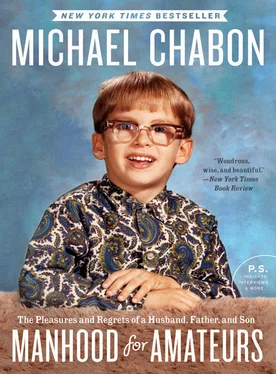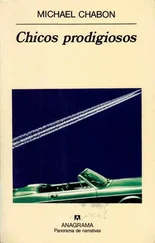I see my disapproval of Captain Underpants, therefore, as a drawing of a line between my son and me, between his world and mine, between adulthood and childhood, as a small, feeble attempt to reestablish the contours of a boundary that in the greater culture has grown vague, disregarded, abused. If I withdraw my approval of Captain Underpants — if I tell my son I will gladly supply him with good books and comics but that if he wants to read those damned Captain Underpants, he’ll have to pay for them himself — that withdrawal creates a gap, a small enchanted precinct of parental disapproval within which he can curl up, for a minute, for the time it takes to read a crass, vibrant, silly 120-page book with big print, one that he paid for himself, and thrill to the deep, furtive pleasure of annoying one’s father. There is no way to draw that line, to re-create that boundary, without engaging in hypocrisy, without condemning, questioning, or diminishing the importance of the things, from ultra-sugary bubble gum to transfatty snacks to Humboldt County sinsemilla, that once stood at the center of my way of loving the world. That’s what sucks about being an adult. Adulthood has always carried a burden of self-denial, of surrendering pleasures, of leaving childish things behind. Maybe that’s why, around thirty years ago, adults started trying to get out of the adult business and into the business of selling childhood. Or maybe it’s that self-denial, surrender, and forswearing are a lot harder to package for retail. It could be hypocrisy is such a toxin that our society is better off without it, even if that means infantilizing adults with late-night programming on the Cartoon Network or merchandising children’s once autonomous culture back to them in shrink-wrapped packs. But it’s hard to think of anything that would be more hypocritical than the selling, to children whose lives we control and regiment down to the quarter hour, of brightly colored confectionery visions of children who are still subject to creative neglect, still free to engage in the most profitable of human activities: wasting time making up crass, vibrant silliness that is all your own.

At least once a month I take my kids to see a new “family movie”—the latest computer-generated piece of animated crap. Please don’t oblige me to revisit the last one even long enough to name the film, let alone describe it. Anyway, you know the one I mean: set in a zoo, or in a forest, or on a farm, or under the sea, or in “Africa,” or in an effortfully hilarious StorybookLand TMwhere magic, wonder, and make-believe are ironized and mocked except at those moments when they are tenderly invoked to move units. I believe but am not prepared to swear that the lead in this weekend’s version may have been a neurotic lion, or a neurotic bear, or a neurotic rat, or a neurotic chicken. Chances are good that the thing featured penguins; for a while the movies have all been featuring penguins. Naturally, there were the legally required 5.5 incidences of humor-simulating flatulence per hour of running time. A raft of bright pop-punk tunes on the sound track, alternating with familiar numbers culled with art and cruelty from the storehouse of parental nostalgia. Creativity, idiosyncrasy, and the fertile rebelliousness of a romantic dreamer were invoked and glorified without recourse to the use or display of any of those three unmarketable commodities.
In principle and in many instances, both as a parent and as a former child, I have nothing against crappy art and the ancillary crap — the extruded action figures and rubber-transfer-stiffened underpants and books of unpeelable stickers, sold separately — that inevitably attends it. First of all, what smells strongly of crap to one generation — Victorian penny dreadfuls, the music of the Archies, the Lone Ranger radio show, blaxploitation films of the seventies — so often becomes a fruitful source of inspiration, veneration, and study for those to come, while certified Great and Worthy Art molders and fades on its storage rack, giving off an increasingly powerful whiff of naphthalene.
More central to my regard — in principle, at least — for the artistic possibilities of crap is my lifelong personal experience with the power of mass art to transport and enrich the imagination of its consumer. I saw a lot of lousy movies and watched a ton of crappy television and read a bunch of utterly forgettable books and comics and listened to hours of junk music as a kid. And I’m still drawing profitably in my own art on some of the tawdry treasure I stored up in those years.
But the acceptance and even the glorification of crap implies no universal obligation. Even without the benefit of generational hindsight, there are distinctions to be made among varieties of crap, and to that end I find myself thinking back to a Saturday afternoon thirty years ago when I went over to the Megginsons’ house to play Planet of the Apes .
There were four Megginson children: Peter, Caroline, Andrew, and Jane. Caroline and I were classmates and Peter, a year older, was my best friend. They lived with their mother in a modest three-bedroom town house at the other end of the Village of Long Reach, in Columbia, Maryland, my hometown. Peter and Caroline each had a room, and the younger pair shared; Mrs. Megginson slept, not without a certain mysteriousness, in a semi-secret basement lair. She was a calligrapher, and the house was filled with the wise sentiments of the revered minds of the day rendered in Mrs. Megginson’s handsome hand. My parents kept a tidy house, but Mrs. Megginson’s laxity as a housekeeper was a point of pride with her, and visitors were cheerfully advised to wash the roach shit from cups and plates taken from her kitchen cabinets. The Megginson father was missing and rarely mentioned, the family budget extremely tight, the car an orange two-stroke Beetle named Agnes (it said so in adhesive calligraphy on her doors). There was always a faint air of possible trouble in the air, a sense that Mrs. Megginson, in her ongoing, hitherto successful efforts to raise four good children on her own, was operating just outside the bounds of accepted suburban-Maryland practice, with financial calamity a real if not quite imminent possibility. I suppose, looking back, that the Megginsons lived nearly as much in bohemia as in Columbia, and these were my first visits to that precarious kingdom.
Through some alchemy of the mother’s artistic nature, the openness of the household, the unfettered nature of American childhood during that time and the sheer mass of children in the house, there was always something afoot at the Megginsons’. When you walked in the door, you would get drafted into whatever large ongoing collective enterprise was under way — making that year’s Halloween costumes, re-creating in card stock and glue a shot of Camelot from a panel in Prince Valiant , writing a rock opera, helping to cope through pie, sauce, and butter with a rapidly spoiling surfeit of apples gathered at Sewell’s Orchard. Usually, some book, TV show, or record album was passionately in vogue around the house, with all play activity — drawing sessions, outdoor adventuring, dinner-table confabulation — focused narrowly around Norse Gods and Giants or Space: 1999 or Queen II . And like one of the progressive rock bands then in their heyday, the Megginsons were busy, all the time, not only with those big double-sided concept albums but with all manner of side projects and solo albums and one-shots: Caroline was learning to read Tarot cards; Peter had found a way to make cool-looking spaceships out of the cap from a Bic pen and the plastic clip from a bread bag snapped in two; Andrew was immersed in the epistemology of Tintin; Jane could not stop talking about Ginnungagap.
Читать дальше
Конец ознакомительного отрывка
Купить книгу













